Respite care for your loved one
When a primary carer needs time away, live-in respite care ensures your loved one is supported at home with minimal disruption.
Learn how Elder makes it easy to find a trusted respite carer.
Find a carerCall us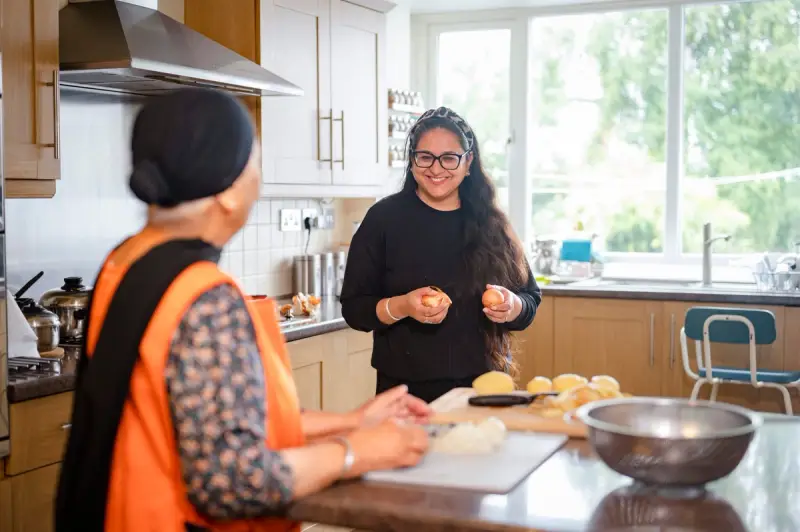
6,000+ Carers
Select from over 6,000 qualified carers
Fast matching
Care can begin in as little as 24 hours
Across Great Britain
We have organised care in every GB postcode
Cost efficient
Costs on average 35% less than traditional services
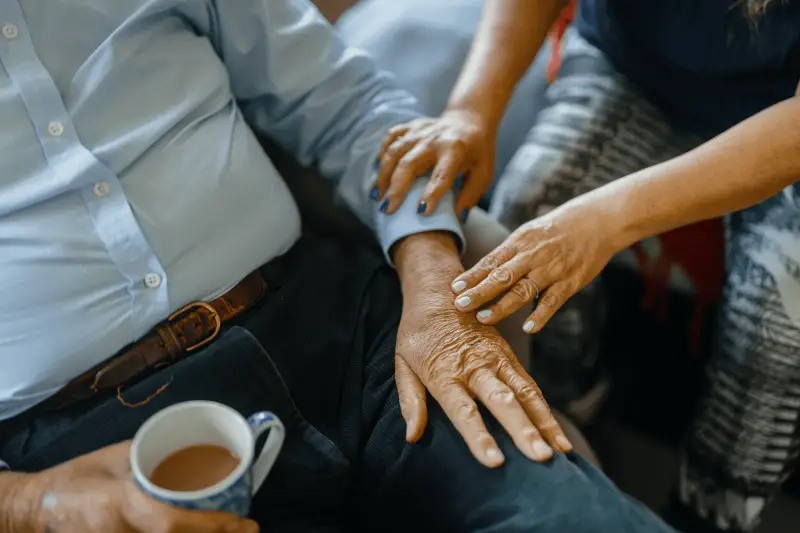
What is respite care?
Respite care is a type of short-term care that allows a primary carer – whether a family member or a professional hired by the family – to take a break from their day-to-day responsibilities. While the main carer steps away, a trained professional temporarily takes over to ensure the older adult continues to receive high-quality support.
Respite care can last from a few hours to several weeks and may take place in the person’s own home through services like live-in respite care, or in a care home or day centre. It’s designed to prevent carer burnout, safeguard the wellbeing of everyone involved, and provide families with flexibility and peace of mind.
What are the different types of respite care?
There are several types of respite care available in the UK, depending on your loved one’s needs, preferences, and the level of care required. Each option offers short-term support to ensure your loved one receives the right level of help while their usual carer takes a break.

In-home respite care
Home-based respite care allows a professional carer to support your loved one in their own home. This avoids changing routines or adjusting to new surroundings. Care is tailored to the individual’s needs and can be arranged for a few hours, overnight, or on a live-in basis. It’s flexible and can be planned in advance or booked regularly.

Residential respite care
Provided in a care home or nursing home, this option offers 24-hour support in a regulated setting. It suits those with complex medical needs or recovering from a hospital stay. Some adjustment to a new environment may be needed, especially for those with dementia.
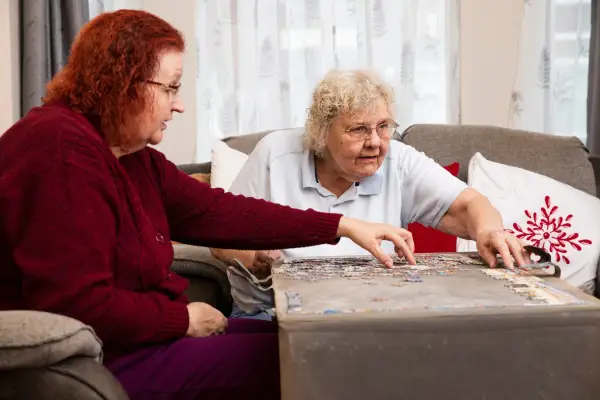
Day centres
Day centres offer structured daytime activities, social interaction, and sometimes personal care. They are best for older adults who enjoy group settings and light stimulation. Some centres provide transport, depending on location and availability.

Respite holidays
Respite holidays give a short break for both the person receiving care and their caregiver. Accessible hotels, retreats, and cruises may provide on-site care. These breaks require planning and are not always suitable for complex care needs.

Why choose live-in respite care?
Live-in respite care involves a self-employed carer of your choice moving into your loved one’s home for a set period of time.
For elderly people with complex care needs, live-in care may support better peace of mind to concerned family members compared to visiting care or residential care. This is because they’ll have the full attention of one dedicated carer.
Elder can also support with emergency respite care. Our responsive service has connected families to self-employed carers within 24 hours, and we can offer greater flexibility around start and end dates.
What are the benefits of in-home respite care?
Respite care offers essential short-term support for older adults, giving their regular carer – whether a family member or a professional carer – time to rest and recharge. Whether planned in advance or needed at short notice, respite care brings peace of mind and practical relief, while ensuring continuity of care for your loved one. Here are the key benefits:
What does a live-in respite carer do?
Personal care
e.g. help with washing, toileting, and prompting medication
Dressing and grooming
e.g. shaving and hairstyling
Meal preparation
e.g. cooking meals to dietary requirements and tastes
Light housekeeping
e.g. vacuuming, keeping surfaces clean and doing laundry
Running errands
e.g. going to the shops or picking up prescriptions
Companionship
e.g. providing company and encouraging hobbies and interests
Pet care
e.g. feeding and exercising pets
Mobility support
e.g. encouraging gentle and suitable exercise
Light gardening
e.g. watering flowers and keeping pathways clear
Admin support
e.g. keeping on top of post, paperwork, and appointments
Medication prompting
e.g. ensuring medication is taken correctly
Ventilation and oxygen support
e.g. BiPAP or CPAP Support
Specialist drug administration
Including Controlled Drug Administration, Covert Medication Administration, Glucose readings via finger pricks, Injections, Pessaries, Enemas, Suppositories
Stoma care
PEG care
Wound care
Hear from some of our respite care customers
We love sharing stories about how respite care has supported families across the UK. Hear from some of our customers and discover how a temporary carer helped their loved ones stay safe and comfortable at home, while giving primary carers the time and space they needed to rest and recharge.
How much is live-in respite care?
With Elder, families pay £684+ for three days, and £1,595+ a week.
As with any type of care, there are funding options available. If you’ve not done so already, it’s worth asking your local authority for a care assessment. They’ll review your loved one’s needs and whether they’re eligible for financial assistance.
If you’re assessed as ineligible for help from your local authority, you may still be able to access help from a benevolent fund or charity. You can find information about possible funding sources from local carers’ groups, your GP, social worker or health visitor.
For more information, read our guide to the costs of respite care.

Looking for dementia respite care?
85% of us would want to stay in our own home if diagnosed with dementia. Elder makes this possible.
- We've helped thousands of families living with dementia
- We'll only match you to carers with dementia care experience
- We're part of Alzheimer's Society's Dementia Friends' initiative
What should I consider before arranging respite care?
Arranging respite care requires some planning to make sure it meets your loved one’s needs and works for everyone involved.
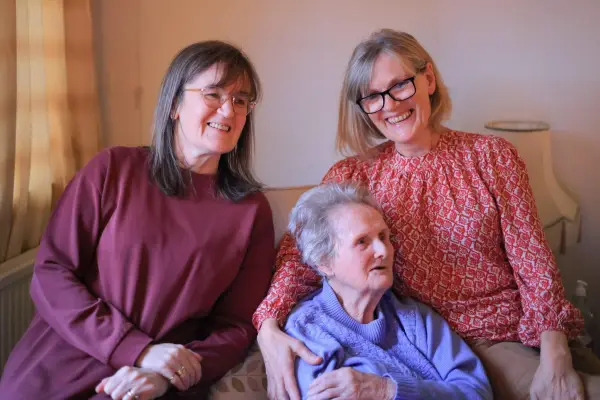
Start with a family discussion
Talk openly with everyone involved in your loved one’s care. Consider their preferences, whether home-based care is suitable, and how to maintain daily routines while you or the primary carer are away. Explore options such as live-in respite care, care homes, or day centres to find the best fit.
Check funding options and get a needs assessment
Contact your local social services team to request a care needs assessment. If your loved one qualifies, a financial assessment will follow to see if they’re eligible for support. This process can take time, so start early. For urgent support, charities like The Carers Trust or Turn2us may provide short-term grants.
Consider a carer’s assessment
Primary carers may be eligible for a carer’s assessment through their local authority. This can provide additional support, including respite care, and formally records how caring responsibilities affect daily life.
Create a contingency plan
Plan ahead for emergencies to ensure peace of mind. Include emergency contacts, health and medication information, care preferences, and your preferred respite care option. Using Elder, these details can be saved in your MyElder account to arrange emergency care quickly and efficiently.
How do I arrange respite care with Elder?
Share your care request
Tell us your care requirements using our request form, including the type of care you’re looking for, any specialist skills you need, and what daily life looks like.
Select your carer
You’ll start receiving profiles of suitable self-employed carers within 24 hours. Chat to them online or arrange a phone or video call, before choosing who you like best.
Manage care
Once your agreement with your carer begins, use your MyElder account to chat with them and the Elder team, manage your schedule and care information, and find respite cover if you need it.
FAQs about respite care
Still have questions?
0333 920 3648The word "respite" means a short period of rest or relief from something challenging. In caregiving, respite care refers to temporary support that allows a carer to take a break – whether for a few hours, days, or weeks – while ensuring that the person they care for continues to receive safe, high-quality support. It’s called respite because it offers carers a chance to recharge, reduce stress, and look after their own wellbeing.
Respite care is suitable for older adults who need short-term support, whether due to illness, frailty, recovery from surgery, or changes in their regular care arrangements. It’s also ideal for people living with long-term health conditions such as dementia, reduced mobility, or other age-related challenges.
At the same time, respite care benefits primary carers by offering them time to rest, recharge, or focus on other commitments. It ensures the person receiving care remains safe, supported, and comfortable while their usual carer takes a well-earned break.
With Elder, you can get respite care within 24 hours. In urgent situations, we can even match families with a suitable carer on the same day.
In some cases, the NHS can fund respite care, but this usually applies when the care is needed for ongoing medical or complex health needs. If your loved one is eligible for NHS Continuing Healthcare (CHC), this can cover the cost of respite care, whether delivered at home or in a care home.
Eligibility is assessed by your loved one’s local Integrated Care Board (ICB) through a Continuing Healthcare Checklist, which looks at factors like mobility, cognition, medication needs, and overall health. If the care required is primarily health-related, a full assessment may follow to confirm funding support.
Yes, respite care is often a very good idea for both your loved one and their regular carer. It offers a chance for carers to take a well-earned break, reduce stress, and avoid burnout, which in turn helps maintain a higher quality of care in the long term.
For your loved one, respite care – especially when delivered at home – ensures continuity, comfort, and safety. It also allows them to stay in a familiar environment with support tailored to their needs. Whether used occasionally or on a regular basis, respite care can strengthen relationships, improve wellbeing, and help everyone involved feel more supported.
A caring role can have big physical and mental health implications. Regular breaks ensure a carer has space to recharge their batteries, safe in the knowledge that a loved one is being well cared for. It helps to prevent caregiver stress and burnout, which over time may influence how you feel about the person you’re looking after.
The live-in carers Elder works with are experienced, independent care professionals but they’re not registered nurses. While they can support with personal care, household tasks, companionship, and daily routines, there are certain medical tasks they can’t carry out. These include administering medication, stoma and catheter care, PEG feeding, and complex wound care.
Not sure if live-in respite care is right for your situation? Create your free MyElder account to speak with a Care Advisor – no pressure, just expert guidance.
In the UK, the 28-day rule affects certain benefits like Disability Living Allowance (DLA), Personal Independence Payment (PIP), and Attendance Allowance if respite care is funded by the local authority. These benefits may be suspended if the person receiving care stays in a care home for 28 days or more, either in one stay or across multiple stays with gaps of 28 days or less between them.
Time spent in hospital before entering a care home also counts towards the 28 days.
However, the rule does not apply if the person is self-funding their care or if there are 29 days or more at home between respite stays.
Sometimes it’s difficult to know how long you’ll need care for, for example if the person who normally provides care falls ill, or if additional support is needed to support recovery after an illness or operation.
With Elder, you can book a period of respite care with a rough end date. Simply give us a call and let us know if you need to extend or amend your dates.
Yes, if your preferred carer is available. It can help to book multiple periods at once if you can, to ensure your requirements can match up with your carer’s schedule.
Not at all. Your MyElder account is a living document – it’ll exist for as long as you need it. All you’ll need to do when booking future care is check that the information in your care profile is still correct, and update any areas where the care needs have changed.
Your MyElder account has been built to be your all-in-one care management platform. With it you can:
- Add other family members to get them involved in the arrangements
- Communicate with your carer and the Elder team via Elder chat
- View your schedule and plan handover days when your carer takes a break
- Read updates from your carer with the Care Logs feature
- Keep the care profile up to date to reflect any changes to your care needs
- Easily update payment information and track your invoices.
To find suitable respite care near you through Elder, simply fill in our request form to share your care requirements, including the type of care needed, specialist skills (if any), and a description of your loved one's daily life. Based on your information, we will match you with potential carers, and you can then review their profiles, chat online or arrange calls to select the best match.
Explore other care options
At Elder, we provide a full range of home care services to suit every need. If your loved one requires around-the-clock support or occasional help for a couple of hours, these options may be more suitable:
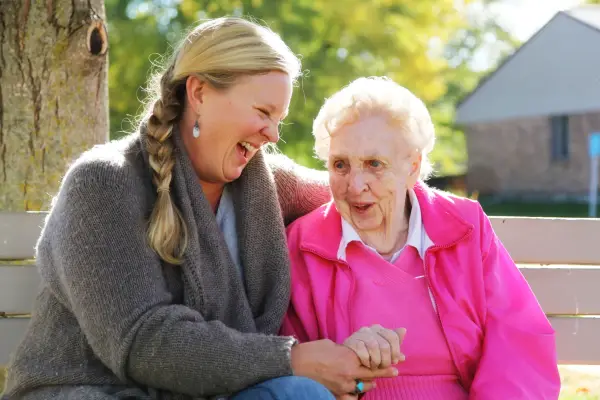
Live-in care
Long-term 24-hour support
- A carer moves in with your loved one to support them 24/7
- Suitable for people living with conditions like dementia and reduced mobility
- For long-term care needs

Visiting care
Flexible home visits
- Book as many hours as you need for help in the comfort of your home
- Support with everyday tasks like grooming, walks, cooking, etc.
- From as little as 1 hour per week





